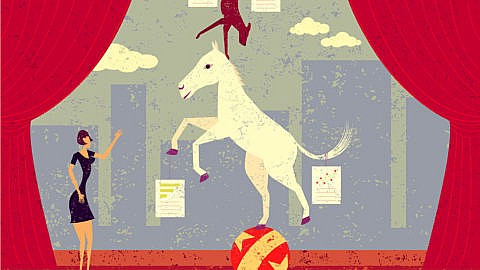You might be thinking, “It’s that time again, event planning season!” As an event professional, you are bound and determined to make your next General Session or National Sales Meeting one to remember. The theme needs to dazzle, the audience has to engage, and the entire production must go off effortlessly without a hitch. Well, OK, effortlessly might be going a bit too far, but you get the picture.
Now that it’s time to start putting the wheels in motion, we all know the success or shortcomings of any event is hugely impacted by the partners you select. As you begin your due diligence, here are some things to keep in mind, pitfalls to avoid, and questions to ask that will help ensure you select the right partner that will help you carry your event across the finish line in grand style.
Don’t Be Overly Impressed by Just the Dog & Pony Show
Ah yes, the vendor pitch. I get it, we all want to be wowed, astounded, and wooed so to speak, but don’t let this part of the process be the ultimate selection criteria.
For those that have been around a while, I know you have had the dubious experience where the “A” team is the one who comes in to pitch and ignites the room but when it comes time to deliver, you find yourself working with the “B” team and feeling a bit flat and disconnected by the efforts of junior staffers.
Don’t get me wrong, there is a lot you can learn from the way a team prepares for a pitch and what they present. This is a great introduction to what they can really do, just don’t let it be the only one. Flashy ideas and sparkling creative can be very impressive, but going from concept in a controlled environment like a small presentation to actually carrying it through to your actual event experience is another.
When you are conducting these fact-finding meetings, treat them as exactly that and use it as an opportunity to really look under the hood and assess not just capability, but approach. Is the team in the room actually listening to you, or are they just presenting? You want to see process in action and glimpses of how they are going to dig deeper to understand your goals and audience needs. More importantly, you need unique ideas that can be brought to bear beyond simply providing execution. You need ideas that can actually shape direction.
Find a partner that is authentic, who wants to get to know your organization, asks a lot of questions, and ultimately devises the right creative solution, not just the right now idea. This approach is not just full-on wiz-bang, rather providing true understanding as to what will ultimately drive innovative creative and provide for a more engaging and immersive event experience. To that end, a great question you can interject is:
“Are there any really exciting concepts/themes/technologies that you have been considering but have not had an opportunity to execute yet?”
This is a great way to get the presentation team “off script” and actually thinking and interacting with you. Either they are going to love having this conversation because they have a lot add, or they will absolutely hate it because beyond what you see in the PowerPoint, there is not much else there.
By shifting the focus of the pitch to more of a working discovery session, you will get a better idea of exactly what kind of partner the team in front of you will make down the road. Their candor, attention, and curiosity about your goals and success metrics will echo far louder than just flash alone. Find the balance and you find your partner!
Don’t Let The Pitch Team Be The Only Team You Meet
You just saw the greatest creative pitch in the almighty history of creative pitches and right there and then, you decide, this is the partner for me. Stop! Don’t make this mistake without further exploration as you could be regretting it every day up until the event and in many cases, long after.
Why? Well think of this. What you saw in that pitch was a carefully crafted experience, meant exclusively for that very finite point in time, not that different from a movie or show on TV. You still need to get a feel for the mechanics and how this will all come together. What you have also yet to see is what the experience of working together will be like. At this point, it’s critical to look a bit further behind the curtain and see how the proverbial sausage is made.
Don’t get me wrong, great creative and concepting sells and absolutely has to be a part of the package, but so does the execution team behind that creative and concepting. Be sure to meet and get a feel for your key account leads. These are the people that you are going to be working with on a day-to-day basis. Based on the amount of time you are going to be spending together, this really needs to be a fit.
Now, and not later, is the perfect time to know how long the account team and team leads have been with their current organization. The last thing you want is to simply have hired guns that come in only on a project basis and have no vested interest in a long-term relationship. Even worse, what happens if an unexpected illness or a family emergency hits your project lead in the middle of this process? Who is going to step in to take over and more importantly, maintain continuity? These are things you really need to know.
Start asking questions about their background, inquire if they have ever worked on a project of a similar size and scope previously, and for your own piece of mind, get a good idea of the best ways to work together, communication and reporting cadence, fail-safes in the process, etc. The more you know about the team, its workings and processes, and just as importantly, personality and cultural fit, the better off your relationship is going to be. Ultimately, how the work gets done and how seamless that happens is going to be as big of a value to you and your team as the creative and theme concept. Those two go together hand-in-hand and need to proceed in lockstep.
Transparency Is Your Friend
The partner that is willing to share is the partner who cares. I know, sounds corny, but it is the absolute truth. There are a million ways and tricks to hide fees or even worse, leave you with a rather large price increase at the end of your event because of the way they priced labor and event staff. For example:
You are comparing two pricing estimates. Estimate One provides a daily/hourly rate that is reflective of an eight-hour day, or for lack of a better description, the lowest common denominator. We already expect at least an eight-hour day, but chances are, it will go longer, and when it happens, you will incur additional labor costs. They have also not detailed out what overtime might really look like.
Estimate Two is providing a fixed rate per day but it’s 10-15% higher than Estimate One. The other caveat with Estimate Two is that this is the final number and is not subject to overtime. The price you see is the price you pay.
We all know that things are going to happen in the course of an event. Changes will need to be made to presentations on the fly, rehearsal times may go long, sessions run over, etc. The list can go on and on. At the end of the day, we know that event staff is more than likely working in excess of eight-hour days. If you have not budgeted for that, it may make for a rather rude surprise when you receive your final reconciliation. Now, ask the provider of Estimate One for a revision taking into account, say, a ten-hour day. Now, you are going to see a distinct flip-flop in which estimate was most cost effective. What seems cheaper is not always the lowest cost option!
OK, a rather long and a very specific example, but it illustrates an important point. You want a partner that is thinking of these things ahead of time and being honest with you about real costs and other expectations. The low bid might win the business once, but ultimately, the partner that acts like a true partner brings exceedingly more value and will help put you in a better position to win within your organization. Confucius Says, “He who hides and does not explain management fees, cost-plus structures, and other fees is not a friend indeed.” Now that is the kind of wisdom I wish came in fortune cookies.
Wow! This Has Been Eye-opening, What Else Should I Be Asking?
You caught me, I’m assuming this has been eye opening or at least, I hope it has. What I wanted to do here is move beyond some of the typical “Questions to Ask” list that I know you have seen a million times like what kind of tools/software do you make use of in the planning process, do you own your own equipment, what technologies are you familiar with, etc.
When we think of events and event planning, as an event professional, you are aptly concerned with two key things: the overall experience of the event in the eyes of the attendees, and what it took to bring that experience to life. When you are going through the process of selecting your next event production and creative partner, keep these two things in mind. Choose your next partner by both the experience they create for the attendees, as well as one that has your best interests at heart and is focused not just on this show, but all the ones down the road.


